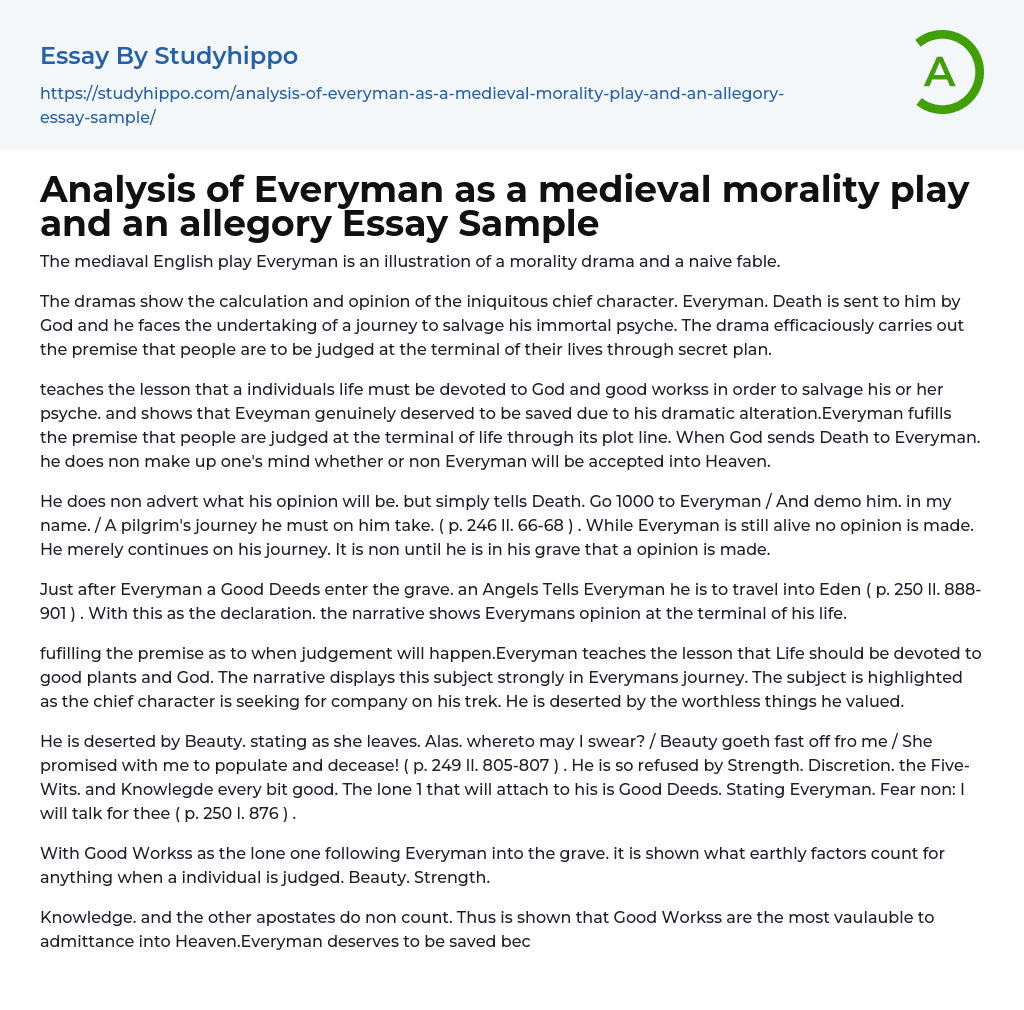

Analysis of Everyman as a medieval morality play and an allegory Essay Sample
The medieval English play Everyman is a moral drama and a simple fable that depicts the thoughts and actions of its sinful main character, Everyman. In this tale, God dispatches Death to summon Everyman, prompting him to embark on a journey to redeem his soul. Ultimately, the play effectively communicates the notion that individuals will face judgment for their deeds upon reaching life's end.
The text proposes that dedicating one's life to God and good deeds is necessary for the salvation of their soul. It also emphasizes how Everyman's transformation demonstrates his deserving rescue. Everyman embodies the concept of individuals being judged upon their lives' conclusion, as portrayed in the narrative. When Death is dispatched by God to confront Everyman, it remains uncertain whether he will be granted admission into Heaven.
He does not mention what his opinion will be, but sim
...ply tells Death: "Go, take Everyman on a pilgrim's journey in my name." (p.)
The opinion of Everyman is not formed during his lifetime; instead, it is developed as he continues his journey. Only after his death, when he reaches the grave, does an opinion begin to take shape. Immediately following Everyman's arrival, Good Deeds also enters the grave.
At the beginning of his journey, an angel informs Everyman that he is required to go to Eden. This revelation connects to the narrative's depiction of Everyman's perspective on life's conclusion and the fulfillment of the prophecy concerning the timing of judgement. The overarching message imparted by Everyman is the importance of dedicating one's life to performing virtuous deeds and honoring God.
The theme of companionship is prominently portrayed in Everyman's journey. Throughout the narrative, the main character searches fo
companionship during his trek. He is abandoned by the material possessions he once valued, including Beauty.
As she leaves, she laments, saddened by the fact that she doesn't know where she can place her trust. Beauty quickly fades away from her. She promised to be with him until the end. He is rejected by Strength.
Discretion, the Five-Wits, and Knowledge are all important. However, Good Deeds is the only one that will stay by Everyman's side, according to Everyman himself.
Do not be afraid, I will speak on your behalf (p. 250 l. 876). It is demonstrated that only Good Works accompany Everyman into the grave, indicating which earthly elements hold significance when a person is judged - Beauty.
Strength, knowledge, and the other apostates hold no significance, indicating that good works carry the most value for gaining admission into Heaven. Everyman's salvation is deserved as he undergoes a profound transformation at the end of the extract.
In the beginning, Everyman is filled with fear and guilt, and he does not want to face God. He plea to Death, asking for twelve years so that his accounting book will become clear, allowing him to no longer be afraid.
As Everyman realizes he has no choice but to travel (247. ll. 136-37).
He says to himself, "How shall I do now for to pardon me? I would to God I had never been guilty. For now I fear immense and great strivings" (p. 248, lines 188-191). Everyman is fearful because he knows he is guilty.
He acknowledges his sinful life, but when he realizes what truly matters and faces his own death, Everyman undergoes a dramatic transformation. He wholeheartedly offers his soul to God
as he enters his grave.
Everyman says, "Into thy custodies, O Lord, I commend my psyche. Receive it."
Oh Lord, please don't let me be lost like the others who have fallen away. Protect me so that I may be counted among the blessed group who will be saved on the day of judgement (p. 250, lines 880-885).
His calculation is clear. Everyman has come to esteem and love God by learning to be pious, thereby deserving salvation. Everyman effectively carries out the premise that people will be judged at death because that is exactly when Everyman receives judgment. He.
Both the readers and every bit good as the readers are taught the lesson that earthly values hold no significance in opinion, but only Christian ideals such as good works. By acquiring this lesson and developing a love of God.
Every person should be saved.
- Baptism essays
- Holy Spirit essays
- Jesus Christ essays
- Adam And Eve essays
- Crucifixion Of Jesus essays
- Crusades essays
- Eucharist essays
- God The Father essays
- Pope essays
- Protestantism essays
- Christian essays
- Church essays
- Elizabeth essays
- Sacrament essays
- Catholic Church essays
- Lord essays
- Priest essays
- Protestant Reformation essays
- Allegory essays
- Alliteration essays
- Comedy essays
- Comic book essays
- Drama essays
- Dystopia essays
- Fairy Tale essays
- Fantasy essays
- Fiction essays
- Ghost essays
- Gothic Fiction essays
- Gothic Literature essays
- Irony essays
- Legend essays
- Memoir essays
- Novel essays
- Poetry essays
- Satire essays
- Science Fiction essays
- Short Story essays
- The western essays
- Tragedy essays
- Witchcraft essays
- Afterlife essays
- Atheism essays
- Bible essays
- Buddhism essays
- Christian Worldview essays
- Christianity essays
- Confession essays
- Cosmological Argument essays
- Deism essays



